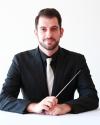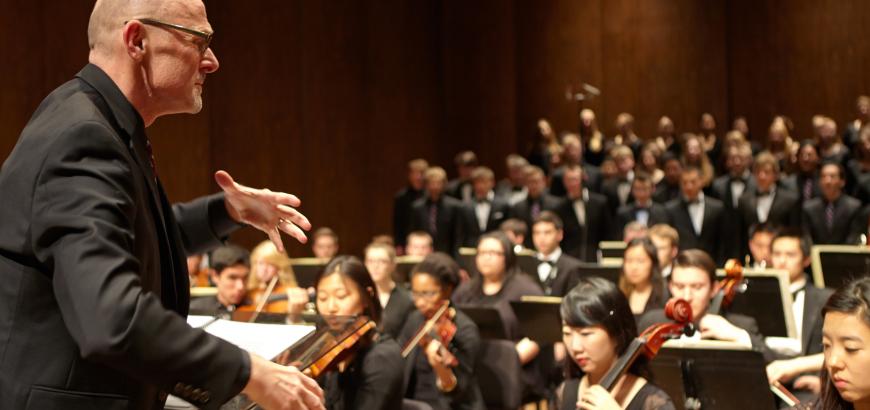Geoffrey Boers leads this year-end program by the University of Washington Symphony (David Alexander Rahbee, director) and combined UW Choirs.
Program
Three Spirituals: Adolphus Hailstork (b. 1940)
I. Every-time I Feel the Spirit
II. Kum Ba Yah
III. Oh Freedom
Daren Weissfisch, conductor
Singers: Mallory McCollum, soprano, Cee Adamson, mezzo-soprano, Zachary Fitzgerald, tenor, Justin Birchell, baritone
“Goin’ Home” from Symphony No. 9, op.95 From the New World: Antonín Dvořák (1841-1904)
Cee Adamson, voice
Earth Symphony: Jake Runestad (b. 1986)
What a Wonderful World: Bob Thiele & George David Weiss arr. Matthäus Crepaz
Program Notes
Adolphus Hailstork, born in Rochester, New York in 1941, is a leading American composer and a Cultural Laureate of Virginia. Educated at Howard University, the Manhattan School of Music, and Michigan State University, where he earned his PhD, Hailstork has taught at various universities and is currently on the faculty of Old Dominion University in Virginia. Known for his technical prowess, expressive directness, and accessible style, Hailstork's compositions span a wide range of genres, often incorporating African-American traditions.
Earth Symphony: Jake Runestad
Over hundreds of years of musical creation, composers developed the symphonic form into a potent, large-scale framework for exploring profound ideas. The sheer number of musicians involved and long duration of the work, allow the time, space, and sonic possibilities for a significant musical journey. For this commission from True Concord Voices & Orchestra, I knew that creating a large work for these forces would necessitate a significant story to tell — one of relevance and power, drawn from our beautiful and complex human experiences. Everyday we hear of more fires, floods, hurricanes, droughts, tsunamis, extinctions, and diseases that impact life around the globe. The earth is changing, due to the impact of human behavior, and how we respond to these changes will determine the survival of our species.
Through brainstorming with my frequent collaborator, poet/librettist Todd Boss, we decided that giving voice to Mother Earth would be a powerful approach for this piece. Todd created a sweeping, gorgeous, and compelling five-part monologue of a mother telling the history of her children — how they admired her, harmed her, and ultimately how she recovered.
Her story begins in a pre-life genesis that tracks the evolution of humans, whose apprehension of Earth’s laws endear them to her as nothing short of miraculous (her beloved “Mirabilia”). Movement 1: “Evolution” hints at the musical themes of each subsequent section and establishes a sonic relationship between Earth (D Major) and humankind (Eb Major), which is explored throughout the work. Movement 2: “Ambition” dramatizes humanity’s fall from grace by retelling the Greek myth of Icarus and harkening to ancient instruments and melodies (including the Seikilos Epitaph — the oldest, complete musical composition yet discovered). Movement 3: “Destruction” charges through a series of ecological cataclysms — forest fire, storms, earthquakes — illustrated by growling brass, raging percussion, and shrieking woodwinds. Movement 4: “Lament” expresses Earth’s grief in a loving farewell to humanity that echoes Henry Purcell’s 17th-century aria, “When I Am Laid in Earth” (Dido’s Lament), and its iconic descending bass-line chaconne. Movement 5: “Recovery” finds Earth restoring balance and moving on, into a deep spacetime like the one from which she emerged. By anthropomorphizing Earth herself, drawing on the familiar earth-mother trope, “Earth Symphony” enables entry into our own ecological shame, guilt, responsibility, potential, and redemption, all from a wide-angled, time-telescoped lens, thereby asking our most immediately pressing environmental questions in an entirely new way.
UW CHAMBER SINGERSSoprano 1 Alto 2 Tenor 2 UW CHORALESopranos University of Washington Symphony Orchestra
David Alexander Rahbee, Music Director and Conductor Flute Piccolo Oboe English Horn Clarinet Bassoon Horn Trumpet Trombone Bass Trombone Tuba Timpani Percussion Piano Harp Violin I Violin II Viola Violoncello Bass |
Biographies

Geoffrey Boers is Director of Choral Activities at the University of Washington in Seattle, a program widely recognized as forward thinking, unique, and of great distinction. Under his direction, the graduate choral program has developed a singular mission: to nurture the whole student as conductor-teacher-servant-leader-scholar. This vision has led the program to become one of the most vibrant and innovative in the country, attracting students from around the world interested in exploring the future of our art. Through his teaching he is exploring the evolution of conducting gesture and rehearsal pedagogy and their connection with the emerging neuroscience of mirror neurons, empathy, perception, learning, and personal transformation. His exploration has led to new thoughts about conducting and teaching with regard to breath, movement, artistry, personal awareness, and cultural development. Recently, his work has led to the mentoring of local choral cohorts of teachers and conductors who are interested in building professional communities of ongoing mentorship and musical development. He has developed such mentorship programs across the United States and Canada. In addition to these thoughts about mentorship he is actively working with other leaders in ACDA and NAfME to develop a more unified and useful system for development of musicianship, assessment, adjudication, and repertoire grading.
Geoffrey maintains an active conducting, teaching, workshop and clinic schedule; his recent engagements have included conducting concerts in Orchestra Hall in Minneapolis, Meyerson Concert Hall in Dallas, New York’s Alice Tully and Avery Fischer Hall at Lincoln Center, the Mormon Tabernacle in Salt Lake City, and Benaroya Hall in Seattle. In addition he has served as artist-in-residence in Toronto, Ontario, Mainz, Germany, as well as Seoul, Korea with the world-renown choir the Incheon City Chorale.
In addition to his position at the UW, Boers sings professionally and is the conductor of the Tacoma Symphony Chorus where he conducts both the choir and symphony players in a four-concert season.
Since his tenure at the University of Washington, the choral program has become a leader in promoting the performance, study and exchange of Baltic music in the United States. The choir has toured to the Baltic countries in 2000, 2005, 2010, and 2013. Geoffrey Boers was awarded a prestigious Royalty Research Grant in 2004 to create a Baltic Choral Library in collaboration with the UW Library as well as State and academic libraries in the Baltic. This collection of scores, manuscripts, vocal music, and writings is the first of its kind in the United States. This collection has promoted yearly exchanges with choirs and conductors from the Baltic area who travel each year to Seattle. Further, it has led to numerous UW choral students winning awards and scholarships to travel, study, and work in the Baltic countries.

Daren Weissfisch has conducted professional and student ensembles in the United States, Mexico, and Europe for over a decade. He is currently pursuing a doctoral degree in Orchestral Conducting at the University of Washington under the tutelage of Dr. David Alexander Rahbee where he is the conductor of the Campus Philharmonia Orchestras, the assistant conductor of the University of Washington Symphony Orchestra, and conductor of the University of Washington Modern Music Ensemble and Opera Theater Works Orchestra. Daren was recently named House Conductor of the Tacoma Opera and he previously conducted the University of Washington’s opera production of Vinkensport by David T. Little and Joseph Haydn’s opera Philemon und Baucis. Daren has also served as cover conductor for the Harmonia Orchestra Seattle and the Issaquah Philharmonic Orchestra. From 2013 to 2019 Daren was the Artistic Director of the Orquesta Sinfónica Esperanza Azteca Sinaloa, which is an El Sistema based youth orchestra and choir in Culiacán, Sinaloa, Mexico. While in Mexico he was the assistant director for the 2016 production of Charles Gounod’s opera Romeo and Juliet with the Orquesta Sinfónica Sinaloa de las Artes under Sinaloense conductor Enrique Patrón de Rueda and the same year he collaborated with French guitarist Jean Bruno Dautaner to record the guitar concerto Tres en Raya by Spanish composer Antonio Ruíz Pipó under the AdLib MusicMX record label. In 2017 Daren conducted the Sinaloa premier of Horizontes, a work by Mexican composer Samuel Zyman, again with the Orquesta Sinfónica Sinaloa de las Artes, and for the 2017 Sinaloa Cultural Festival Daren founded the ensemble Sinaloa Players which presented Stravinsky’s masterpiece Histoire du Soldat in collaboration with renowned Mexican choreographer Mauricio Nava. Daren was a conducting student of Michael Jinbo at the Pierre Monteux Festival and School for several summers and he also studied with many notable conductors including Ludovic Morlot, Donald Schleicher, Kensho Watanabe, Lior Shambadal, Edward Cumming, Charles Olivieri-Munroe, Gábor Hollerung, Linus Lerner, Carlos Spierer, Sandro Gorli, Glen Adsit and Timothy Salzman among others.
Daren is also an oboist and was the second/assistant principal oboist of the Orquesta Sinfónica Sinaloa de las Artes in Sinaloa, Mexico from 2010-2019 as well as soloist playing oboe concertos by Mozart, Strauss and Bach. He is also a substitute player in the Seattle area with the Bainbridge Island Symphony Orchestra, Harmonia Orchestra Seattle and the Lake Union Civic Orchestra among others.
